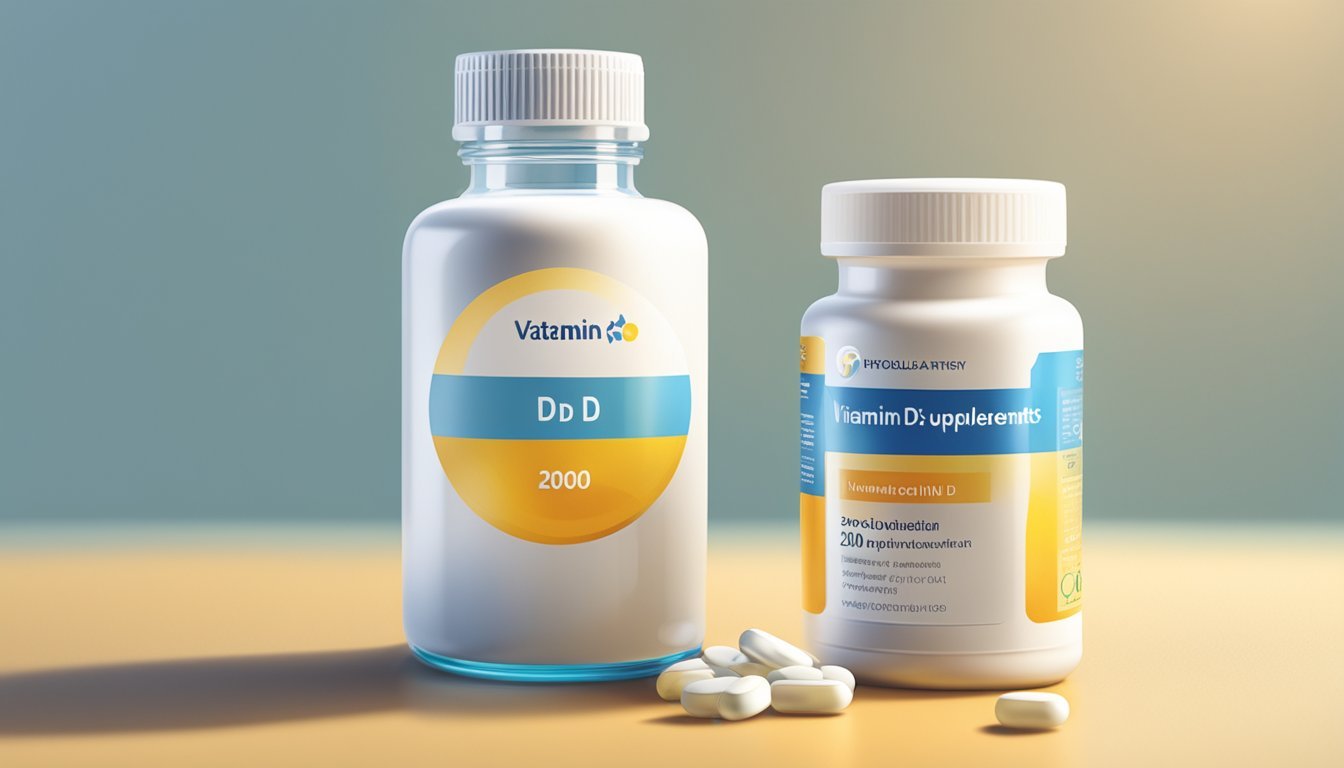Vitamin D 2000 IU: Boosting Health with the Sunshine Supplement
Vitamin D supplements have gained significant attention in recent years due to their crucial role in maintaining overall health. Among the various dosages available, 2000 IU of vitamin D has emerged as a popular choice for many individuals seeking to optimize their vitamin D levels.
Research suggests that a daily vitamin D supplement dose of 2000 IU (50 µg) can effectively raise and maintain serum 25(OH)D concentrations above 50 nmol/L, which is considered beneficial for health. This dosage strikes a balance between being potent enough to address deficiencies and safe for long-term use in most adults.
When selecting a vitamin D supplement, factors such as form, additional ingredients, and third-party certifications should be considered. Many high-quality options are available in the market, offering 2000 IU of vitamin D in easy-to-swallow capsules or softgels. Some products are formulated to be vegetarian, gluten-free, and free from artificial additives, catering to various dietary preferences and restrictions.
Understanding Vitamin D
Vitamin D is a fat-soluble vitamin essential for human health. It plays a crucial role in maintaining strong bones, supporting the immune system, and regulating calcium absorption.
The human body can produce vitamin D when skin is exposed to sunlight. This process occurs naturally when ultraviolet B (UVB) rays interact with a form of cholesterol in the skin.
Despite its name, vitamin D functions more like a hormone in the body. It undergoes two important conversions to become active:
First in the liver
Then in the kidneys
Factors that can affect vitamin D levels include:
Geographical location
Time of day and season
Skin pigmentation
Use of sunscreen
Age
Obesity
Individuals with limited sun exposure or certain health conditions may be at risk for vitamin D deficiency. Kidney failure can impair the body's ability to activate vitamin D, potentially leading to deficiency.
Vitamin D supplements are available to help maintain adequate levels. The most common forms are D2 (ergocalciferol) and D3 (cholecalciferol). Many experts consider D3 more effective at raising blood levels of vitamin D.
Proper vitamin D intake is crucial for optimal health. However, excessive amounts can be harmful. Regular blood tests can help determine individual vitamin D needs and guide supplementation strategies.
The Role of Vitamin D in Health
Vitamin D plays a crucial role in maintaining overall health and well-being. It impacts bone strength, immune function, and mental health through various mechanisms in the body.
Bone Health and Calcium Regulation
Vitamin D is essential for strong bones and teeth. It helps the body absorb calcium from food and supplements, promoting bone mineralization. Without adequate vitamin D, bones can become thin, brittle, or misshapen.
The nutrient also regulates calcium levels in the blood. This balance is critical for proper muscle function and nerve signaling. Low vitamin D levels are linked to an increased risk of osteoporosis, especially in older adults.
Vitamin D supports muscle strength and reduces fall risk in the elderly. This protective effect, combined with improved bone density, can help prevent fractures.
Immune System and Disease Prevention
Vitamin D strengthens the immune system, helping the body fight off infections and diseases. It enhances the function of immune cells that attack harmful pathogens.
Research suggests vitamin D may play a role in reducing the risk of respiratory infections. Some studies have found a link between low vitamin D levels and increased susceptibility to acute respiratory distress syndrome.
Vitamin D's anti-inflammatory properties may help prevent autoimmune diseases. It has been associated with a lower risk of conditions like rheumatoid arthritis and type 1 diabetes.
Emerging evidence suggests vitamin D might play a role in cancer prevention. However, more research is needed to fully understand this potential benefit.
Mood Regulation and Mental Health
Vitamin D receptors are present in brain areas involved in mood regulation. Low levels of this nutrient have been linked to an increased risk of depression.
Some studies suggest vitamin D supplementation may improve symptoms of depression, particularly in people with vitamin D deficiency. However, results are mixed, and more research is needed.
Vitamin D might influence the production of serotonin, a neurotransmitter that affects mood. This connection could explain its potential impact on mental health.
Seasonal Affective Disorder (SAD), a type of depression related to changes in seasons, has been associated with low vitamin D levels. Supplementation may help alleviate symptoms in some cases.
The Specifics of Vitamin D Supplements
Vitamin D supplements come in various forms and dosages. Understanding the different types, recommended amounts, and how to choose the right supplement is crucial for optimal health benefits.
Different Forms of Vitamin D
Vitamin D supplements are available in two main forms: ergocalciferol (D2) and cholecalciferol (D3). D3 is the preferred form, as it's more effective at raising blood levels of vitamin D.
D3 is derived from animal sources, while D2 comes from plant sources. Both forms are available as tablets, capsules, liquids, and gummies.
Some supplements combine vitamin D with calcium or other nutrients for enhanced absorption and effectiveness.
Evaluating Dosages and RDA
The Recommended Dietary Allowance (RDA) for vitamin D varies by age and health status. For adults up to 70 years old, the RDA is 600 IU (15 mcg) daily. Adults over 70 need 800 IU (20 mcg) per day.
Recent studies suggest higher doses may be beneficial. Some experts recommend 2000 IU daily for optimal health benefits.
It's important to note that the upper limit for adults is 4000 IU per day. Exceeding this amount may lead to vitamin D toxicity.
Regular blood tests can help determine individual vitamin D needs and prevent overdose.
Choosing the Right Supplement
When selecting a vitamin D supplement, consider the following factors:
Form: Choose D3 for better absorption
Dosage: Opt for supplements that provide 1000-2000 IU per serving
Quality: Look for third-party tested products
Additional ingredients: Avoid unnecessary fillers or allergens
Consider supplements that combine vitamin D with vitamin K2 for improved calcium absorption and bone health.
Consult a healthcare provider before starting any new supplement regimen, especially for those with medical conditions or taking medications.
Factors Influencing Vitamin D Needs
Vitamin D requirements vary among individuals due to several key factors. These include age, skin pigmentation, geographical location, lifestyle choices, and dietary habits.
Age-Related Considerations
Older adults typically need more vitamin D than younger individuals. As people age, their skin becomes less efficient at producing vitamin D from sunlight exposure. This reduced capacity can lead to an increased risk of deficiency in older populations.
Adults over 70 may require higher vitamin D intake to maintain optimal blood levels. Some studies suggest that older adults might benefit from 2000 IU daily supplementation to support bone health and immune function.
Impact of Skin Pigmentation
Skin color significantly affects vitamin D production. Individuals with darker skin have more melanin, which acts as a natural sunscreen. This protective feature reduces the skin's ability to synthesize vitamin D from sunlight.
People with darker skin tones may need up to 5-10 times more sun exposure than those with lighter skin to produce the same amount of vitamin D. As a result, they might require higher vitamin D intake through diet or supplements to maintain adequate levels.
Geographical and Lifestyle Variables
Location and lifestyle play crucial roles in vitamin D status. People living in northern latitudes or areas with limited sunlight exposure are at higher risk of deficiency. During winter months, vitamin D production from sunlight can be minimal or non-existent in these regions.
Indoor lifestyles, extensive use of sunscreen, and covering skin for cultural or religious reasons can also reduce vitamin D synthesis. These factors may necessitate increased dietary intake or supplementation to meet vitamin D needs.
Nutritional Sources of Vitamin D
Diet can significantly impact vitamin D levels, especially for those with limited sun exposure. Natural food sources of vitamin D include:
Fatty fish (salmon, mackerel, tuna)
Fortified foods like milk, orange juice, and cereals also contribute to vitamin D intake. However, it can be challenging to obtain sufficient vitamin D from diet alone, particularly for vegans and vegetarians.
Dietary supplements, such as vitamin D3 (cholecalciferol), are often recommended to ensure adequate intake. The commonly suggested dose of 2000 IU daily can help maintain optimal blood levels for many adults.
Health Risks and Safety Concerns
While vitamin D supplementation of 2000 IU daily is generally considered safe, there are potential risks and concerns to be aware of. Proper monitoring and awareness of symptoms are important for safe supplementation.
Recognizing Vitamin D Deficiency
Vitamin D deficiency can lead to various health issues. Common symptoms include:
Fatigue and weakness
Bone pain or muscle aches
Mood changes, including depression
Blood tests measuring 25-hydroxyvitamin D levels can diagnose deficiency. Levels below 20 ng/mL (50 nmol/L) indicate deficiency, while 21-29 ng/mL (52.5-72.5 nmol/L) is considered insufficient.
Risk factors for deficiency include:
Limited sun exposure
Dark skin
Obesity
Malabsorption conditions
Early identification and treatment of deficiency can prevent complications like osteoporosis and muscle weakness.
Monitoring for Toxicity and Side Effects
Vitamin D toxicity is rare but possible with excessive supplementation. Signs of toxicity include:
Nausea and vomiting
Confusion
Weakness
Kidney problems
Regular blood tests can monitor calcium and vitamin D levels to prevent toxicity. Most adults can safely take up to 4000 IU daily without risk.
Side effects are uncommon at 2000 IU daily. Some people may experience mild gastrointestinal discomfort. Severe side effects like kidney stones are typically associated with much higher doses or underlying health conditions.
Interactions with Other Medications
Vitamin D can interact with certain medications:
Steroids: May interfere with vitamin D metabolism
Statins: Vitamin D may increase statin absorption
Thiazide diuretics: Can increase calcium levels when combined with vitamin D
Patients with liver disease should consult their doctor before supplementing, as the liver plays a role in vitamin D activation.
Individuals taking medications or with chronic health conditions should discuss vitamin D supplementation with their healthcare provider to ensure safety and appropriate dosing.
Guidance from Healthcare Professionals
Healthcare professionals play a crucial role in advising patients about vitamin D supplementation. Many recommend 2000 IU daily as a safe and effective dose for most adults.
Registered dietitians often suggest this amount to help maintain adequate vitamin D levels. They emphasize the importance of individualized advice based on factors like age, skin tone, and sun exposure.
Medical research supports the 2000 IU recommendation. Studies have shown this dose can effectively raise and maintain healthy vitamin D levels in the blood without risk of toxicity.
Doctors may prescribe higher doses for certain medical conditions. Patients with severe deficiency or absorption issues might need temporary increases under medical supervision.
Healthcare providers stress the need for regular blood tests to monitor vitamin D status. This allows for dose adjustments as needed.
Consultation with a healthcare professional is essential before starting any supplement regimen. They can assess individual needs and potential interactions with medications or health conditions.
Experts caution against exceeding 4000 IU daily without medical guidance. While vitamin D toxicity is rare, it's important to follow recommended dosages.
Supplement Use in Special Populations
Vitamin D supplementation needs vary for different groups. Pregnant women, nursing mothers, and older adults often require tailored approaches to maintain optimal vitamin D levels.
Pregnancy and Breastfeeding
Pregnant and breastfeeding women have increased vitamin D requirements. The recommended daily intake is 600 IU, but many experts suggest higher doses of 1000-2000 IU for these groups.
Adequate vitamin D during pregnancy supports fetal bone development and may reduce the risk of complications. For breastfeeding mothers, supplementation helps ensure sufficient vitamin D in breast milk.
Healthcare providers may recommend blood tests to determine appropriate dosage. Women with low vitamin D levels may need higher doses under medical supervision.
Senior Adults and Bone Density Concerns
Older adults are at higher risk of vitamin D deficiency due to reduced skin synthesis and decreased dietary intake. Many experts recommend 800-2000 IU daily for seniors.
Vitamin D supplementation, often combined with calcium, plays a crucial role in maintaining bone density and reducing fracture risk in older adults. It may also help improve muscle strength and balance.
For seniors with osteoporosis or osteoarthritis, higher doses might be prescribed. Regular monitoring of vitamin D levels is important to ensure optimal supplementation.
Some studies suggest vitamin D may have additional benefits for cognitive function and immune health in older adults, though more research is needed.
Practical Tips for Vitamin D Supplementation
Vitamin D supplements are widely available in 2000 IU doses. This amount is generally considered safe and effective for most adults.
Take supplements with a meal containing fat to enhance absorption. Foods like cheese, egg yolks, and olive oil can boost vitamin D uptake.
Consult a doctor before starting supplementation, especially for those with malabsorption issues or who have had gastric bypass surgery.
Regular blood tests can help monitor vitamin D levels. Aim for a 25(OH)D concentration above 50 nmol/L.
Be aware that obesity may affect vitamin D status. Higher doses might be necessary for individuals with a higher body mass index.
Pregnant women should discuss vitamin D needs with their healthcare provider, as requirements may differ during pregnancy.
Some medications can interact with vitamin D. Always inform your doctor about all supplements you're taking.
Choose reputable brands that undergo third-party testing for quality assurance.
Store supplements in a cool, dry place away from direct sunlight to maintain potency.
If you have vitamin D insufficiency, your doctor may recommend a higher initial dose before moving to a maintenance dose.
Remember that vitamin D from sunlight and food sources also contributes to overall intake. Balance supplementation with these natural sources.








